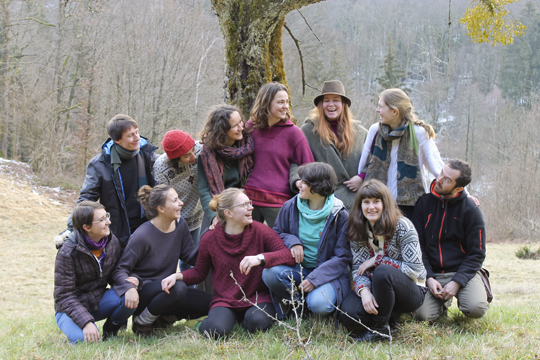“Welcome appreciation”
Freiburg, Oct 30, 2019
The “Initiative Nachhaltigkeitsbüro” launched in May 2018 quickly became an official club. Now, at the start of 2019-20 academic year, the friends of the university association has awarded its Alumni Prize to the group. The prize is endowed with 2,000 euros.

Environmentally active students: The Sustainablility Office receives award from the Förderverein Alumni Freiburg e.V.. Photo: Sustainability Office
Laila Heising says the Alumni Prize is “welcome appreciation.” The 24-year-old Science student and Student Union environment officer hopes that the prize will “open new doors to us so that we can pursue our cause with even greater support.” The student initiative, whose members are also involved in other socio-environmentally-oriented university groups, combines student lobbying for more sustainability at the university.
The students have already opened lines of communication with university faculties, the administration and the Rectorate. For example, it was the university’s environmental protection office which proposed the award go to the student initiative. The students are pleased that a sustainability manager has recently been employed at the university and say that will help to more firmly anchor this complex of topics at the university - as they have been calling for from the beginning. The student initiative wants to see comprehensive environmental reporting on operations, administration, teaching and research. In a pilot project proposed by the Sustainability Office, student assistants at the Faculty of the Environment and Natural Resources have started recording all emissions generated during business trips.
Thinking about the environment and society at the same time
The group’s chairman, Benjamin Thober, a 28-year-old student of interdisciplinary anthropology, sees the Alumni Prize as confirmation of his conviction that “ecological and social issues are not mutually exclusive - they must always be thought of together.” This conviction is reflected in the title of a lecture series for the winter semester conceived by the Sustainability Office: “Sustainability and (in)Justice,” which traces the social connections of environmental topics from global inequality to intergenerational justice and gender issues. It follows a first lecture series in summer semester 2019, which followed “blind spots” in sustainability discourse. The Alumni Prize money gives the student initiative a small budget from which to engage speakers for the lecture series. As Thober and Heising point out, it takes considerable time and effort to raise the money for fees, travel expenses and accommodation.
The lecture series is intended as a first step towards a Studium Oecologicum which is slated for launch in the coming summer semester and which is to be slowly expanded. Existing courses in the field are to be incorporated, supplemented by further classes, and taught in different forms. The students say the concept they have developed has been well received by the university’s management. Some of the ideas it is modeled on can be found at Berlin’s Humboldt University and at the University of Tübingen. The aim is to get sustainability firmly anchored in teaching – as a voluntary interdisciplinary course – for students of all disciplines, instead of being restricted to individual subjects and faculties such as the Faculty of the Environment and Natural Resources.
Connecting all those involved
The decisive factor here is cooperation with all the university’s actors in the field of the environment and sustainability: from the Rectorate, to the faculties, to administrative staff. One possible anchor is the Centre for Key Qualifications, which could offer the Studium Oecologicum – awarding ECTS credits and certificates – as part of the interdisciplinary element in Bachelor's degree programs, which aims to teach students universal professional skills. Points can be earned already – by attending the lecture series.
Anita Rüffer
www. nachhaltigkeitsbuerofreiburg.de
Lecture series on sustainability and (in-)justice
The lecture series focuses on the main theme of “(in-)justice,” shedding light on how it affects the sustainability debate. The lectures take place at the following times:
07.11.2019 (Bio-)Diversity & Gender; Kollegiengebäude I, lecture hall 1010
21.11.2019 Climate Justice; Kollegiengebäude II, lecture hall 2004
05.12.2019 Environmental Protest; Kollegiengebäude I, Horst-Weitzmann lecture hall 1098
09.01.2020 Neoliberalism; Kollegiengebäude I, Horst-Weitzmann lecture hall 1098
23.01.2020 Generations and Time; Kollegiengebäude III, lecture hall 3118
06.02.2020 Nature Ethics/ Consumer Justice; Kollegiengebäude I, Horst-Weitzmann lecture hall 1098
The events start at 6 pm. The lectures are in German. All welcome. There is no need to register; admission is free.

